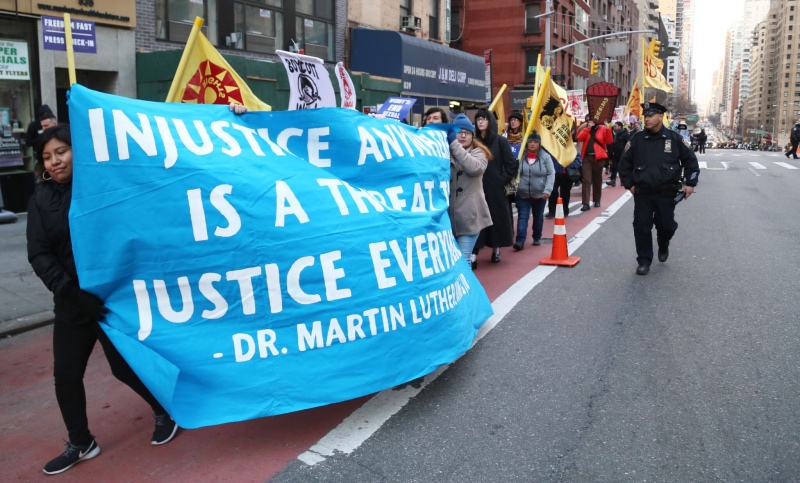
Washington Post Op/Ed: Fair Food Program’s “results are stunning… given the exploitative starting point of big agriculture, the transformation is nothing short of miraculous.”
A powerful opinion piece published in last Thursday’s Washington Post – penned by Gillian Thomas of the ACLU’s Women’s Rights Project and titled “#MeToo hasn’t fixed the workplace. Here’s a playbook that can,” (11/29/18) – provides the very latest example of a high-profile endorsement of the CIW’s Fair Food Program as the prescription for ending sexual harassment and assault at work, in the fields and beyond.
The editorial begins with an in-depth look at progress in the fight against sexual harassment since the Harvey Weinstein scandal broke last year and arrives at an inauspicious conclusion: “(T)he dispiriting reality is that the past year has seen only baby steps in the right direction.” The author then proceeds to examine the various strategies deployed by advocates thus far, from litigation to legislation, and discusses the many barriers and limitations to those approaches that have blunted their impact and caused them to result in only “modest gains.”
And that’s when the piece turns to the Fair Food Program:
… A formal model of worker-driven collaboration with consumers could do incalculable good if adopted more widely. The Fair Food Program, launched in 2011 in the tomato fields of Florida by the Coalition of Immokalee Workers, targets degrading work conditions, including brutal sexual abuse. (Some studies have found that 80 percent of female farmworkers have faced harassment, including rape and other assault.) It enlists the consumers of big agriculture — namely, the fast-food restaurants and supermarket chains that spend hundreds of millions of dollars on Florida tomatoes every year, such as Taco Bell, Whole Foods and Walmart — as enforcers against such abuses. The buyers pledge to pull their business from farms that violate a worker-authored code of conduct, and the workers themselves are the monitors. An independent body conducts investigations and unannounced audits of participating farms, with 80 percent of complaints resolved in less than a month. The consequences of violations are swift and strict: Harassers are fired and temporarily banned from reemployment at participating farms, while growers that fall consistently short face probation or suspension from the program.
The results are stunning. Since the program’s inception, no cases of rape or attempted rape have been reported, and only one supervisor has been found to have engaged in physical harassment since 2013. During last year’s growing season, not a single sexual harassment complaint was lodged at more than 70 percent of participating farms. What’s more, only 15 percent of the farms where complaints arose saw evidence of retaliation against accusers. Progress like this would be noteworthy for any industry, but given the exploitative starting point of big agriculture, the transformation is nothing short of miraculous.
The Fair Food Program’s model now covers several agricultural products across half a dozen states. The Vermont-based Milk With Dignity program follows the same approach; it has snagged Ben & Jerry’s as a partner. Such success is replicable in other consumer-driven industries. Indeed, in recognition of the power consumers wield, in September the American Hotel & Lodging Association launched an initiative under which members pledge to undertake anti-harassment measures such as providing “panic buttons” to housekeepers. Hilton, Hyatt, Marriott and Wyndham are among the hotels touting their participation in an effort to win customer loyalty… (read more)
We highly recommend that you read the op/ed, which you can find here, in its entirety. It is an extremely well-written, informed analysis of the problem of sexual harassment on the national level, and of the proven track record of prevention of sexual abuse in the workplace provided by the Fair Food Program and its worker-driven, consumer-powered strategy for monitoring and enforcement.
The Washington Post editorial adds another strong voice to the growing chorus of endorsements of the Fair Food Program, from the Harvard Business Review to the New York Times Editorial Board. But while experts agree on the FFP’s unique power for concrete, measurable success in the fight against sexual violence, modern-day slavery, and other extreme human rights violations that continue to haunt workers at the bottom of corporate supply chains around the globe today, far too many corporations – including Fortune 500 companies like Wendy’s, Costco, Kroger, and Safeway – continue to resist consumers’ calls to demand that their suppliers join the Fair Food Program and meet the gold standard for human rights enforcement.
And that’s where you come in. If there is one thing we have proven beyond a doubt here at the Campaign for Fair Food, it is this: When workers and consumers speak with one voice, the billion-dollar brands have no choice but to listen. And we are telling them what we want. We are telling them it is time for a human rights revolution, from the fields of Florida to the movie sets of California.
Check back soon for the very latest from the Fair Food front – including a very important announcement about this spring’s big action in the Wendy’s campaign!

